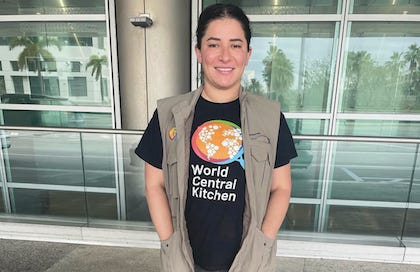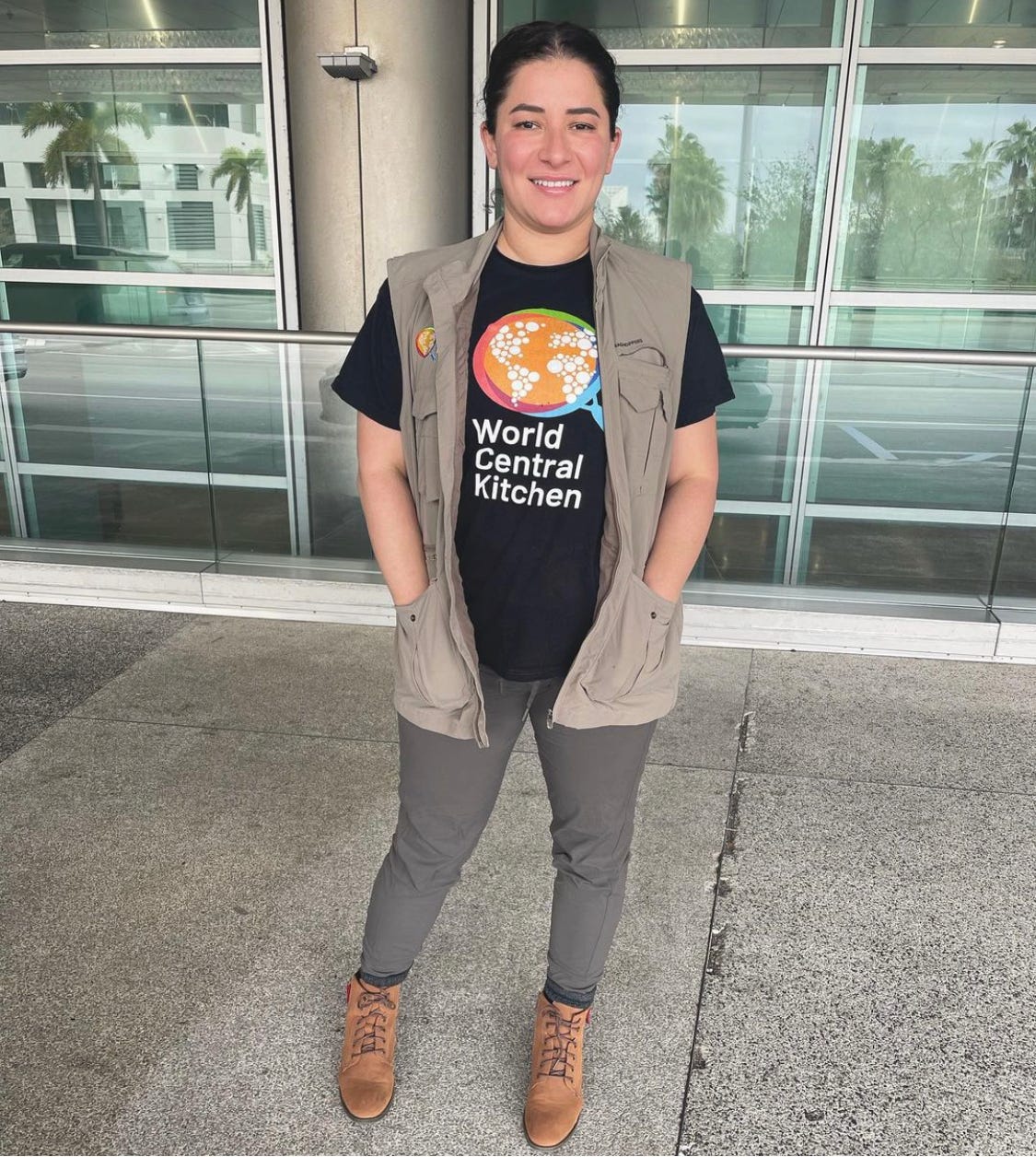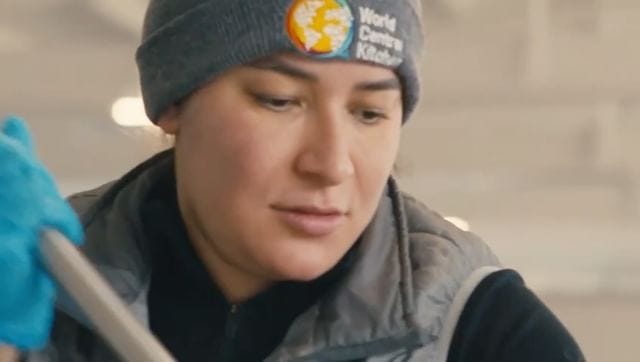Meet a Food Fighter: Karla Hoyos
At the heart of our operation is Karla, one of WCK's Disaster Relief Chefs
I’m a storyteller and some of the most important stories I can tell you are about the people who really make WCK what it is today.
We’re a small NGO with a big impact, thanks to people like Karla Hoyos.
Karla is also one of WCK’s Disaster Relief Head Chefs. Most recently, she flew to feed families affected by mass floods in Bangladesh, but prior to that she was overseeing our commissary kitchen on the border of Ukraine in Przemyśl, Poland.
I met Karla in Puerto Rico in the wake of Hurricane María. We believe in communities feeding themselves. Right now the people of Ukraine are feeding the people of Ukraine.
But at the same time, the local chefs and cooks—along with the mayors and governors—are often overwhelmed. It was obvious to me that we couldn't just rely on the chefs who we partner with; they are small operators who need to get their own restaurants back into business.
So we needed to bring in chefs who knew how to cook at volume to help establish our base, support the local restaurants, and prepare our own hot meals.
Puerto Rico after Hurricane María was our first big feeding operation. I wanted to feed the whole island—an island with no power, little water, and no support from the federal government. (You can watch We Feed People, the documentary Ron Howard made about our missions in Puerto Rico and beyond, now streaming on Disney+ and Hulu if you’d like to see our team in action!)
To find the right people, I reached out to my friends running big catering and restaurant businesses back on the mainland.
After one email to my friend Fedele Bauccio, CEO of the Bon Appetit catering company, I was introduced to Karla, a chef known not only for her organization and culinary skills, but for her devotion to impact work. She often organized gala dinners for groups like Africa Outreach and was president of an organization called Amigos, helping immigrant families in the U.S. who are dealing with deportation or the criminal justice system.
So when my request arrived, Fedele immediately knew who to contact.
Karla has told me many times about the night she got the call from her manager. It was very late on a Friday, and given the hour, she started to panic, wondering what she had done wrong. Her manager quickly explained that nothing was wrong; it was that I wanted her to come to Puerto Rico and cook with me. Karla did not hesitate to say yes. We told her to buy a satellite radio, bring cash, and get to the airport in the morning.
I remember when Karla arrived in El Choli, the sports arena in San Juan, she immediately took charge, organizing and planning the kitchen and its operations. She quickly helped establish order and structure, even though we had no power. She chased down suppliers and organized our teams to the point where we could ramp up quickly. Karla became the heart of our operation in Puerto Rico and a key figure in how we fed the island. From those early days, I knew she would be central to our work.

Karla has been with me ever since. After Puerto Rico she joined ThinkFoodGroup in Miami as chef de cuisine at Bazaar in South Beach, and she has been with us on many activations with WCK— in the Bahamas, in Haiti, during the pandemic in Miami, in Spain, and in Ukraine.
When she is not in a disaster zone, she is getting ready to open her very own restaurant in Miami, Tacotomia, an homage to her grandmother’s cooking. (Follow Karla here on Instagram, @chefkarlahoyos, for updates!)
Karla grew up in Veracruz, the child of a Spanish father and Mexican mother. Both cultures put a huge emphasis on food and family, and her two grandmothers had a deep respect and love for food. Growing up, she spent a lot of time with her grandmother from the countryside in Veracruz, where she cooked on wood fires and made everything from scratch.
Karla learned her pastry skills in France and dreamed of becoming a chef, even when her dad wanted her to become a lawyer. She set up a little pastry business in Mexico City before going to culinary school.
From there, she did a stage with my friend Martín Berasategui, the brilliant three-starred Basque chef, and another at Rekondo, a traditional Basque restaurant in San Sebastian. Then it was off to Italy where she cooked in the Chianti region at a trattoria where, as she describes it, she learned to cook “all the good stuff—all the classic Italian dishes like a nonna.”
When she returned to the U.S., she opened a Mexican restaurant with her aunt who was living in Indiana. Two years later, she started her career at Bon Appetit Management Co. as an executive chef at Depauw University. Her experience there gave her the skills she would need in the field—learning systems, processes, and the ins and outs of high-quality, large-scale meal production.
When Karla came to Poland just days after the invasion, she did what she does so well; she transformed an empty warehouse without much power into a production kitchen with 12 ovens, eight paella pans–each one can feed 3,000 people—several prep tables, and a 2000-square foot walk-in cooler. Under Karla’s leadership, the kitchen feeds people all day and all night…it’s been producing tens of thousands of meals a day.

The toll on our team is particularly difficult here, working at the border of a country at war. We see families coming across, women with their elderly parents and their children. They’ve lost everything and have been walking for days.
Karla says she tries to focus on what she can do, not what she can’t. “The people coming across the borders are alive but there are others who are not,” she told me. “They are alive and they have an opportunity to be safe. They can have a new life, and my job is to get it together and get to work. That’s why I am here. I am here to help them. To give them that hope.”
For all of us, a plate of food is a plate of hope. We see this every day when people are sharing a bowl of stew with families in flight.
When she was still in Poland a few months ago, Karla told me that she’d fed a family of four—a mother, grandparents, and a little girl. “They were on the side of the tent with their suitcases and eating the stew I had made,” she said.
“They were eating with so much enjoyment and joy. I could see the steam coming off of the bowl, so I knew it was a warm meal. They were eating so vigorously. I watched them for a long time. It brought tears to my eyes.
“I thought, ‘This is it. This is why I am here and I need to keep doing it.’”








This brought me to tears. God bless you all!
The best of humanity. Thank you for sharing Karla's story.